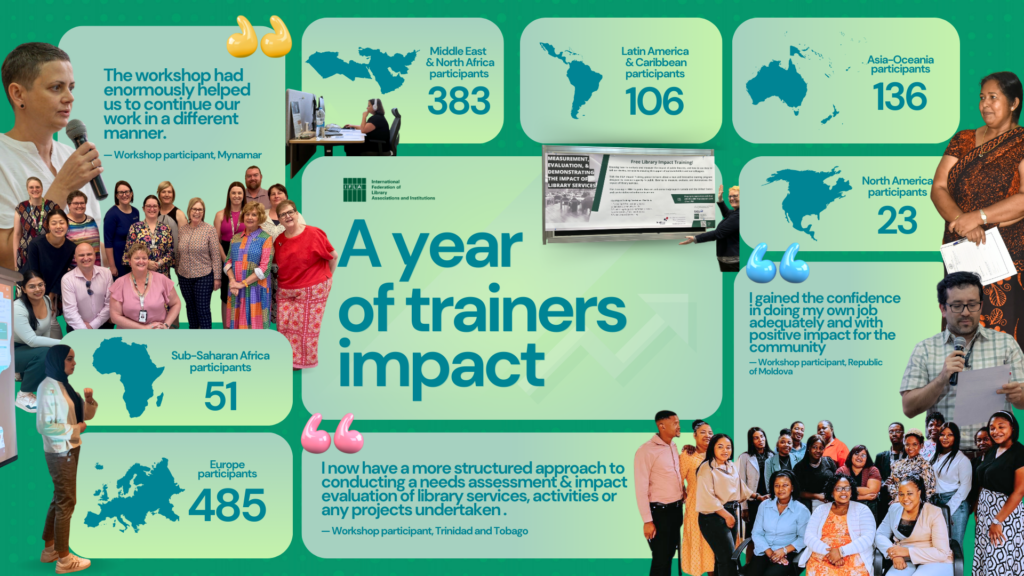A year of building an impact focus within the library field
20 December 2024
More than a thousand library workers in all regions of the world benefited from IFLA’s training programme on “Measurement, evaluation, and demonstrating impact of library services” in 2024. We are grateful to all our partners—library associations, libraries, library support organisations in training locations. This project was supported by Stichting IFLA Global Libraries, which administers the grant awarded by the Gates Foundation to support IFLA’s work.
IFLA is committed to building a culture of impact evaluation across the field to ensure that library and information workers have the knowledge and skills necessary to plan for, deliver, and demonstrate the impact of library services that they deliver for communities.
IFLA’s training programme on measurement, evaluation and demonstrating the impact of library services provides a framework and tools to strengthen the necessary knowledge and skills. The goal is to help libraries better understand their changing communities, plan activities to meet needs and make a difference, measure performance, and evaluate outcomes and impact. As an outcome, our trainees are better equipped to ensure all stakeholders truly understand the value and impact of libraries. All of this ultimately bring benefits for people and communities.
In November 2023, we held a Train-the-Trainer workshop to familiarise twelve Impact Trainers with the training programme. In 2024, we continued working with trainers to deliver the modules of training programme through presentations, seminars and workshops. Full or adapted versions of programme were delivered across all regions—1,184 library workers benefitted from the programme in one or another way.

These professional development events took place in 21 different countries, both in person and virtually.
| Region | Professional development event locations |
| Asia-Oceania | Australia, Myanmar, Sri Lanka |
| Europe | Greece, Ireland (virtual), Latvia, Republic of Moldova (virtual), Ukraine (virtual) |
| Latin America and the Caribbean | Argentina, Chile, Trinidad and Tobago |
| Middle East and North Africa | Egypt, Iraq, Jordan, Oman, Qatar, Syria |
| North America | Canada, United States of America |
| Sub-Saharan Africa | Kenya, Namibia |
The programme’s reach extends beyond the above-mentioned 21 training locations as some of the events hosted participants from other countries in the region, thus in total reaching programme beneficiaries in 63 countries of the world.
Almost all workshop participants agreed that they obtained new and/or improved existing knowledge and skills (93.3%). The same number (93.3%) confirmed that the knowledge and skills they obtained will be useful in their work. Nine in ten programme participants (91.3%) said that as the result of the training they feel better prepared to evaluate and demonstrate impact of libraries.
Training evaluation shows a net promoter score of 77.9, which demonstrates a high probability of recommending this training to others.

Participant insights
“At this training I gained so much information on the topic that I heard first time about.” – Workshop participant, Jordan
“The main conclusion from the training: library institutions must not only provide quality services, but also be able to evaluate and demonstrate their impact on the community. This includes the use of various methods and tools to collect data, present information on the significance and value of library services.” – Workshop participant, Republic of Moldova
“Librarians need to think creatively to collect useful data to tell compelling stories about the services they provide – i.e. their value.” – Workshop participant, Australia
“[My main takeaway is] the importance of using feedback and qualitative data from your community to guide your services and resource development, and not just doing things because we think we need to.” – Workshop participant, Australia
Next steps
The programme will be continued in 2025 to continue filling the knowledge and skills gaps and expanding our capacity as the library field to plan for delivering meaningful change, evaluate outcomes and demonstrate impact.
This work was made possible by the financial support of the Bill and Melinda Gates Foundation, via Stichting IFLA Global Libraries (SIGL). SIGL was created by IFLA and the Gates Foundation’s Global Libraries Programme in order to administer the Legacy Grant awarded to support IFLA’s work.